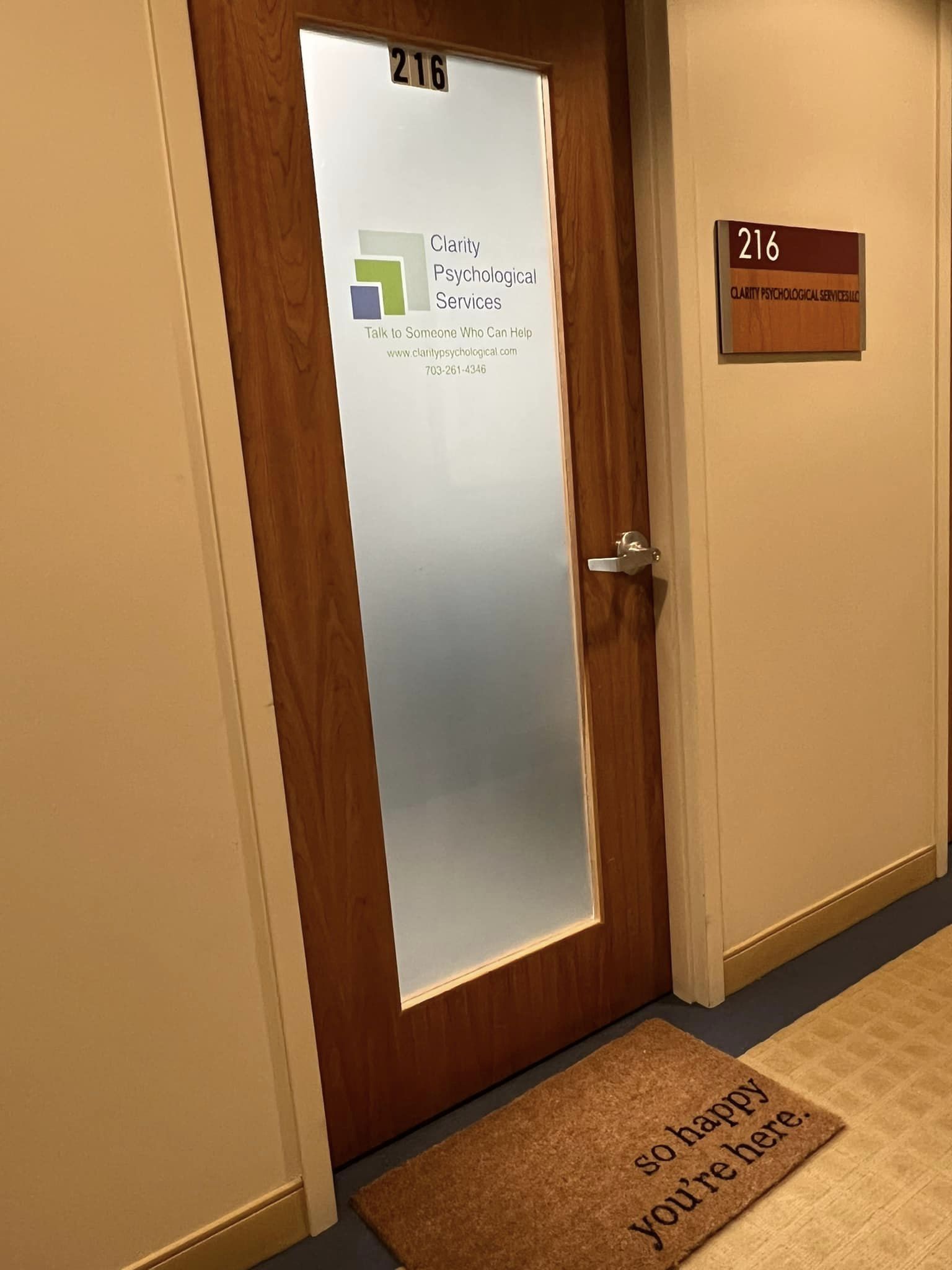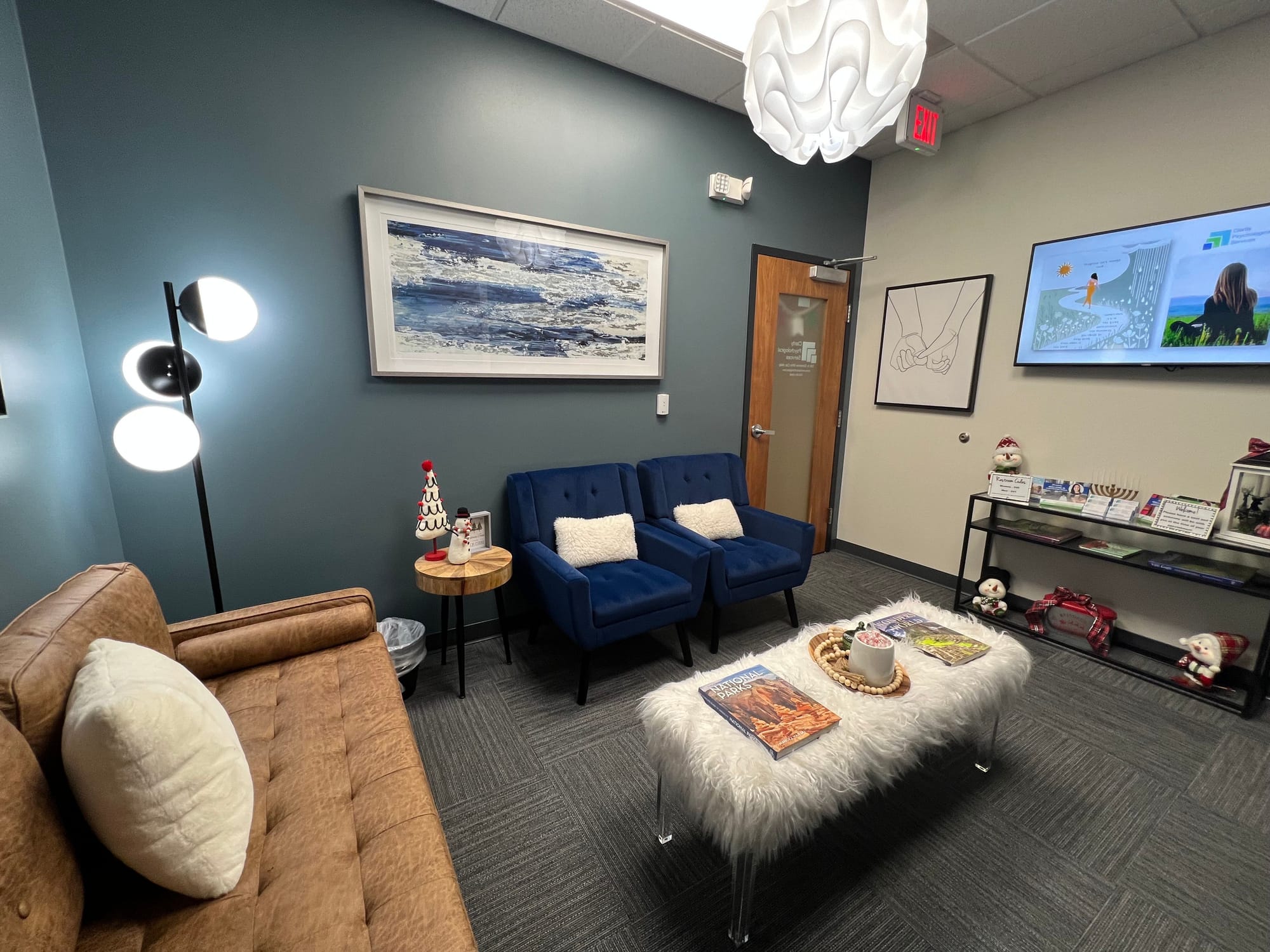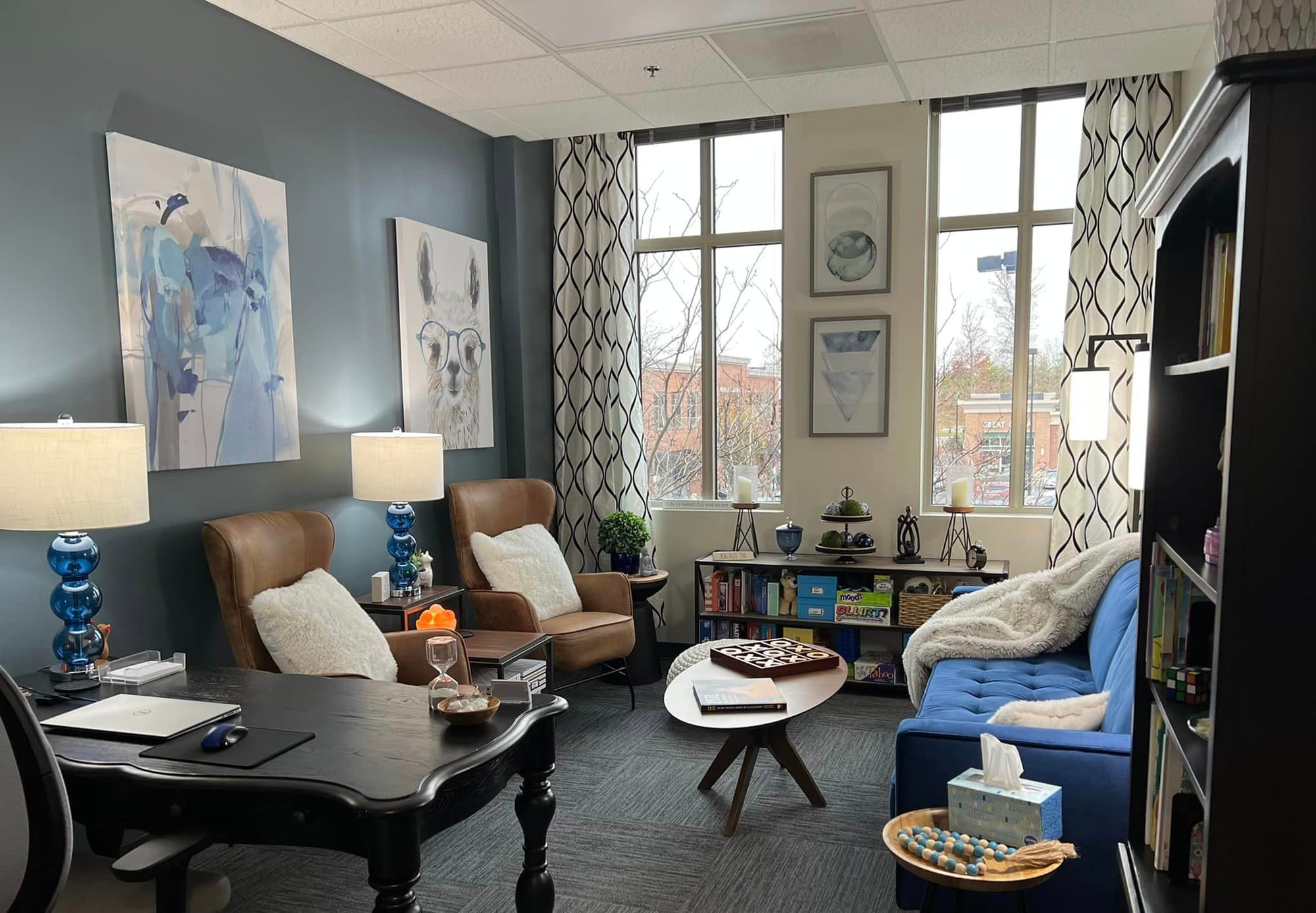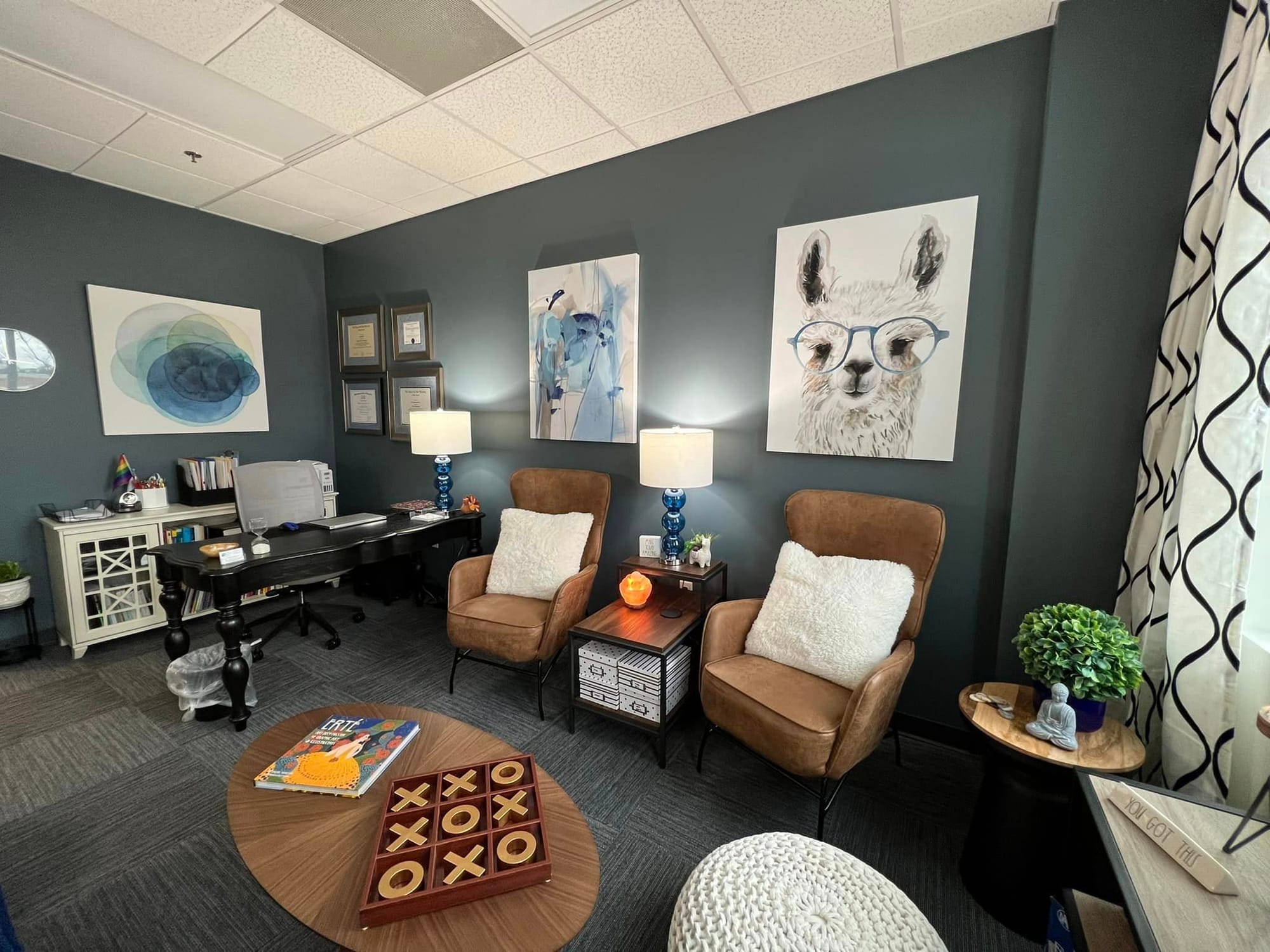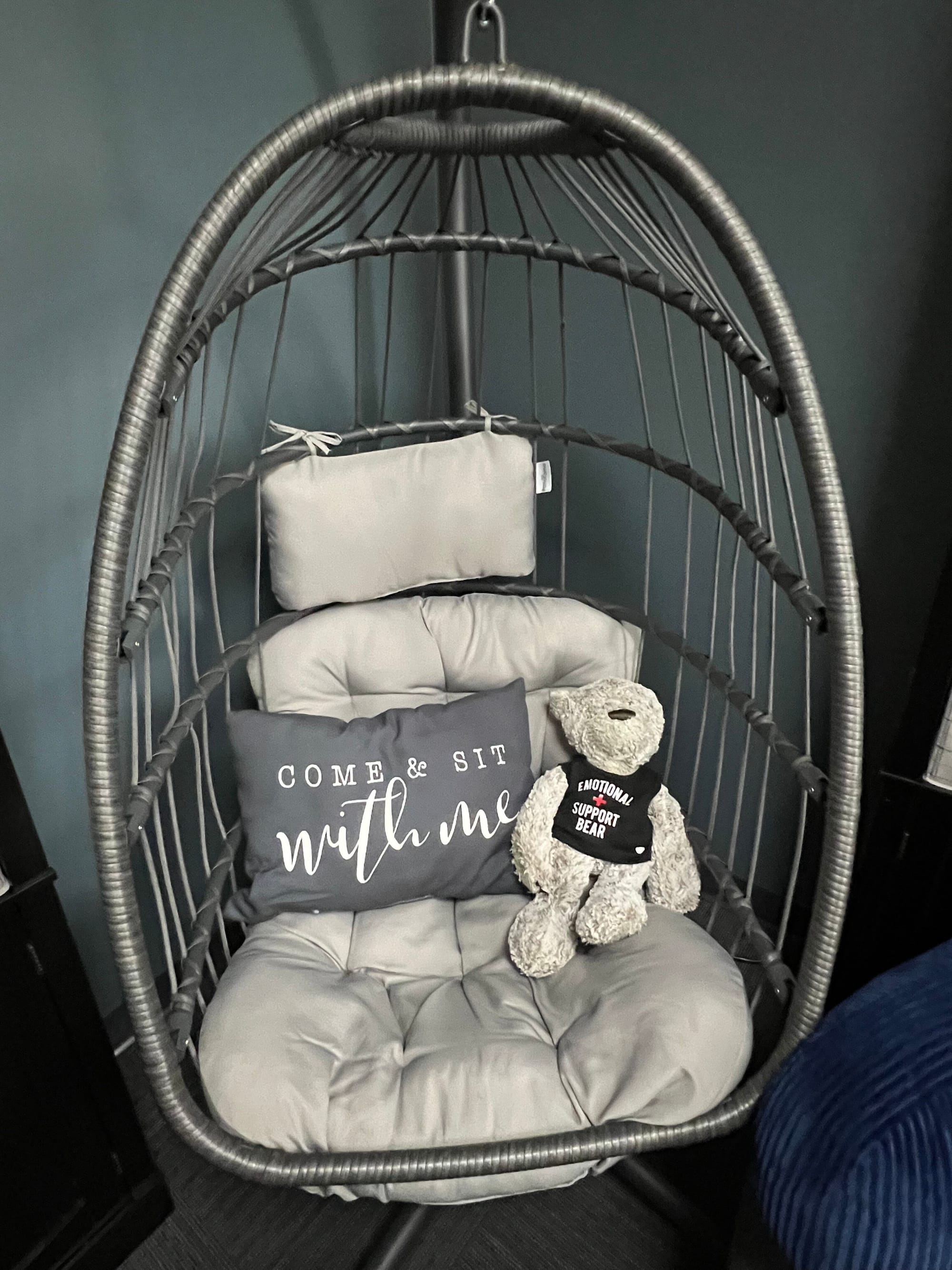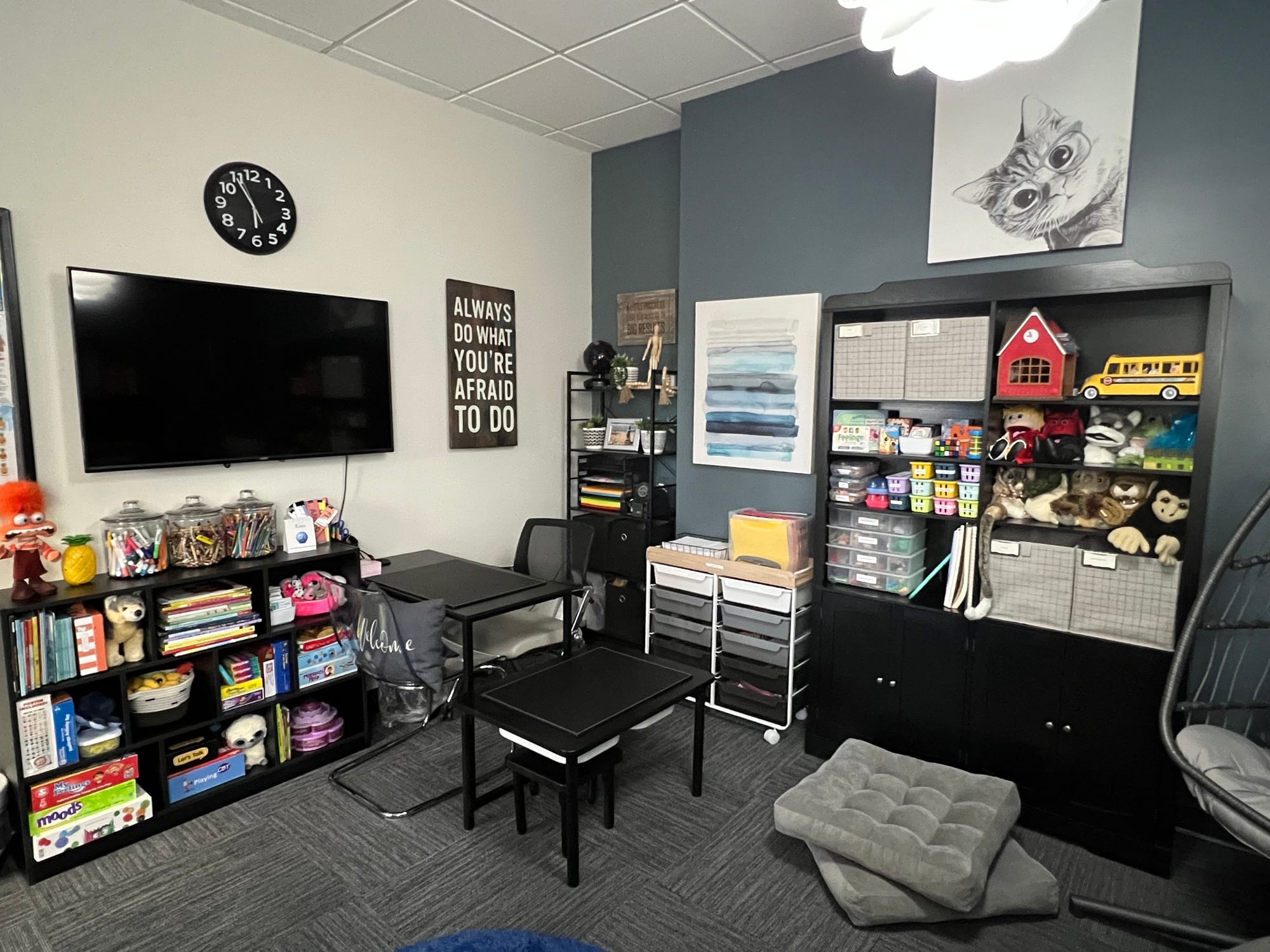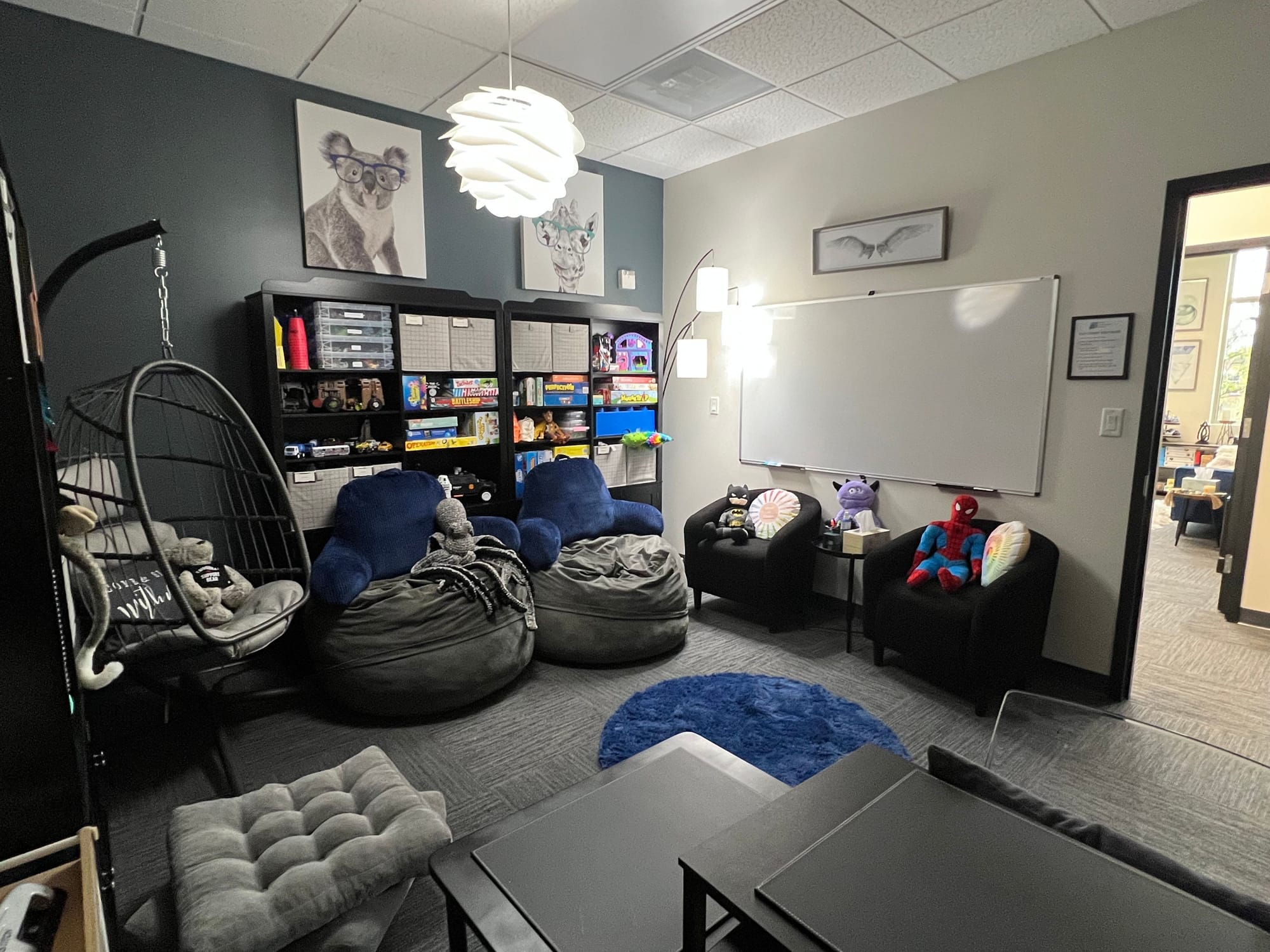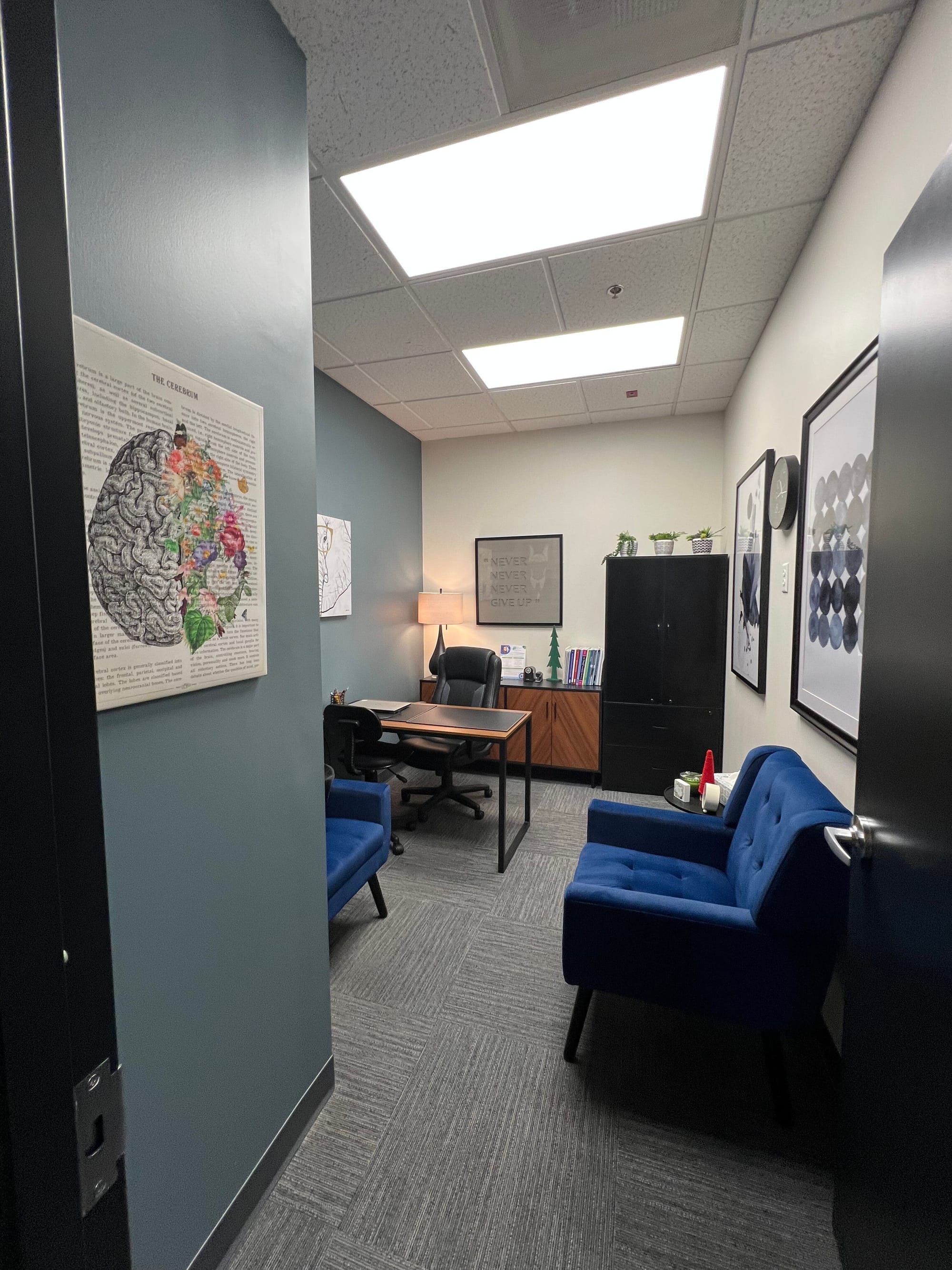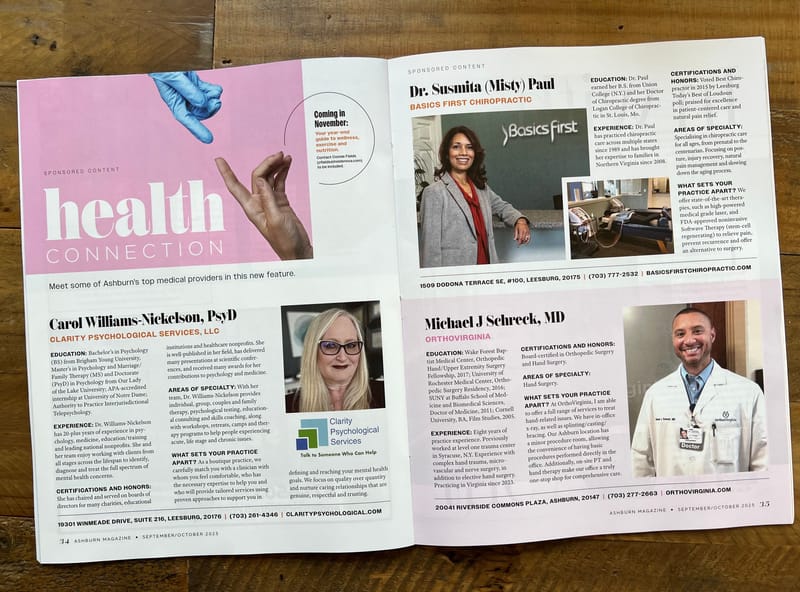Talk to Someone Who Can Help
Welcome
We are glad you found us!
If you are here, reading this message, kudos to you for having the courage and resolve to take the first step to take care of yourself or a loved one.
We are glad you found us! We are a boutique practice where we take an individualized approach from start to finish. We want you to have a good experience with us in your pursuit of psychological services. We are committed to doing all we can to carefully guide you through the process of finding the right treatment within our practice for your needs and situation. If we do not think we can be maximally helpful to you, we will be candid and tell you, and provide referrals as appropriate.
Finding quality services can be daunting, especially if this is all new for you. There are a wide range of professionals to choose from who have various degrees, certifications, and licenses to practice in the mental health profession and provide a range of psychological, psychiatric, and counseling services. It can be confusing and overwhelming to determine what type of clinician and which approach is the best option for you.
Finding the right help is important.
Once you are well-matched with a qualified, competent clinician, your treatment process can be life-enhancing and transformational. It is worth your investment of time in advance to make sure there is a strong fit.
At Clarity Psychological Services, we will walk you through this process and do our best to match you to a provider from our diverse team with whom you feel comfortable, who has the necessary expertise to help you, and who will provide tailored services using proven approaches to help you define and reach your mental health goals. We provide outpatient services at our practice, usually through regularly recurring weekly or bi-weekly sessions. We do not offer on-call, crisis, or intensive outpatient services.
We do not just assign clients to any available clinician or any treatment modality.
Our priority is to understand you and your needs well so that we can support you with a suitable provider and by developing and implementing an appropriate evidence-based treatment plan that is customized, dynamic, and adaptable as you make progress and your needs evolve. If we reach a point in your treatment that requires a higher or different level of service and expertise than we feel we can provide, we will recommend alternative treatments, programs, or clinicians.
We look forward to the opportunity to learn more about you
and to determine how we can help.
IMPORTANT NOTICE:
Mental health services are in high demand and our capacity is limited. Clinician availability, wait times for initial appointments, and program offerings will vary depending on the caseloads of current clinicians, your scheduling flexibility, and other factors.
We make decisions about accepting new clients after an initial intake evaluation is finished and based on our clinical judgment, business policies and practices, and other variables.
If you would simply like a consultation meeting to discuss your needs, we are happy to schedule a consultation session, which requires less initial paperwork. Direct fees apply for consulations.
Making an inquiry about services and engaging in communication about services
with any member of our staff does not establish a therapeutic or professional relationship or
equate to accepting you as a new client, nor does it guarantee that we will offer
or hold an appointment slot for you.
On a case by case basis, we may offer to add you to a wait list to be considered
for a particular clinician or service after the intake assessment process is complete.
About
We are here to help.
Services include:
Individual, Group, Couples, and Family Therapy
Assessment and Evaluation (Psychological, Neuropsychological, and Educational Testing, with Diagnosis and Treatment Recommendations)
Independent Eduation Evaluation (IEE)
Diagnostic Screenings for ADHD, Autism and Other Neurodiversities
Educational Consulting and Behavior Support
Parenting Workshops
Life Skills Coaching and Workshops
Executive Function Coaching and Workshops
Programs:
Child and Adolescent Skill Development and Therapy Groups
(Focusing on Anxiety and Depression, Social Skills, Executive Functioning, and more.)
College-age Therapy Groups
(Focusing on Interpersonal Skills, Organizational Skills, Life Transitions, Independent Living, and more.)
We work with clients in all stages of life, beginning as young as 6 years old.
Issues addressed include, but are not limited to:
ADHD
Anxiety
Anger
Autism Spectrum
Bullying
Conflict
Depression
Emotional Dysregulation
Executive Functioning
Grief and Loss
Opposition and Defiance
School Problems
Friendship and Social Challenges
Substance Abuse
Relationship Concerns
Risk-taking Behaviors
Obsessions/Compulsions
Stress
Self-Harm Behaviors
Parenting and Co-Parenting
Panic and Phobias
Identity
LGBTQ+
Trauma
Eating and Body Image
Women's Issues
Job and Career Development
Life Transitions/Adjustment
Personality Disorders
Chronic Mental Illness
Leadership Coaching and Support for C-Suite Executives
Treatment is available in-person and via telehealth.
(Telehealth services are provided when deemed clinically appropriate.
Some clients may not be good candidates for telehealth services.
This will be discussed between the client and clinician
during the intake assessment process.)
We have the Authority to Practice Interjurisdictional Telepsychology (APIT) through PSYPACT with 42+ participating states. Click HERE for a current list of PSYPACT states.
Insurance
Our clinical providers are in-network with Anthem, CareFirst/BCBS, and United/Optum.
We do not accept Medicare or Medicaid.
We do not accept insurance for testing.
(Please note that we may stop in-network participation at our
discretion, and will inform current clients in advance if/when we do.)
We are out-of-network with other insurance companies.
(Upon request, we will gladly provide you with a receipt that you may
submit to your insurance company to seek out-of-network
reimbursement per your insurance plan.)
Self-Pay
Please contact our office for our fee schedule for self-pay clients.
(Clients often use their Health Care Flexible Spending Accounts (FSA) to set
aside pre-tax dollars to pay for mental health services. For various reasons,
clients may choose to pay for services entirely out of pocket.)
Co-payments (and full payment for self-pay clients) are due at the time
of service via debit, credit, or Health Savings Account (HSA) debit cards.
(We require that a card remain on file in our HIPAA-compliant platform
with your authorization to automatically charge co-payments and
appropriate fees as they are incurred.)
Good Faith Estimates are provided in advance, as applicable
and in accordance with the No Surprises Act.
Services
We provide psychotherapy, psychological testing, neurodiversity evaluation, educational consulting, executive performance coaching, and medication management, as well as workshops, camps, and professional development seminars.

First Things First: What is psychotherapy and how does treatment work?
Psychotherapy, also known as "talk therapy," is a general term for treating mental health problems by discussing your thoughts, feelings, and behaviors with a mental health professional. Therapy provides an opportunity to learn more about yourself, your symptoms, and various causes and solutions to your problems. There are many psychotherapy approaches and your therapist will help determine what might be the best approach for your situation.
Learn More
Individual Therapy
One-on-one psychotherapy sessions usually occur on a weekly basis. Sessions may also take place every other week, monthly, or on an as-needed basis, depending on the frequency agreed on between you and your therapist and according to your goals and treatment plan. Both in-person and telehealth sessions are offered.
Learn More
Group Therapy
Group therapy involves working with your therapist alongside other people experiencing similar concerns. In addition to giving and receiving peer support, group therapy also provides clients with the chance to learn and practice new skills in a safe, nonjudgmental, and confidential environment.
Learn More
Couples Therapy
Relationships take work and need maintenance. Couples therapy helps you and your partner understand each other better, improve communication patterns, and address challenges ranging from parenting differences, anger, betrayal, compatibility, intimacy, and other experiences that affect the quality and your satisfaction in the relationship.
Learn More
Family Therapy
Family therapy is a useful treatment to promote understanding, more effective communication, validation, and collaboration among all to help solve problems, increase compassion, and promote positive family functioning. All members of the family are considered the "client" and everyone in the family system has a role to play in improving healthy interactions.
Learn More
Psychological, Neuropsychological, and Educational Testing
Emotional, behavioral, developmental, neurodiversity and educational testing is valuable in identifying, explaining, and making recommendations to address a range of problems and concerns that occur in daily life and different environments. Our psychologists are well-versed and experienced in creating customized testing batteries, completing timely evaluations, and writing individualized and comprehensive reports to help the client, parents, treating clinician, schools, and other professionals better understand the client's functioning and best methods for support and intervention.
Learn More
Screenings for ADHD, Autism and Other Neurodiversities
If you suspect that you or your child, might have ADHD, Autism or other forms of neurodiversity, or your primary care physician has recommended a screening, we provide abbreviated assessment protocols for this purpose. We will conduct an intake session, then meet with you again to administer, score and interpret appropriate tests, and finally, schedule a follow-up to to provide and discuss a brief written report with findings and recommendations for interventions or further testing, as warranted.
Learn More
Life Skills Coaching
Life coaching is a parternship to help you bridge the gap between where you are now in your life and where you want to be. Life coaching is future-focused. It centers on setting goals, identifying obstacles, and creating actionable plans to achieve measurable outcomes. Your Certified Life Coach will use powerful questioning, provide understanding with accountability, and offer structured support, to help you gain clarity, build confidence, and sustain momentum in areas such as career, relationships, health, and personal development.
Learn More
Psychiatric Medication
We are currently referring out to our colleagues for medication management. Medication services involve an initial evaluation to determine the need for psychotropic medications, providing prescriptions, and ongoing medical monitoring related to the use and effectiveness of the psychotropic medication(s). Psychiatric medications are prescribed by medical doctors (such as psychiatrists), psychiatric mental healthnurse practitioners, and certain psychologists who have specialized training.
Learn More
Workshops and Training
Workshops on common psychological topics are offered for clients and the community, such as anxiety management, coping with depression, parenting, strategies for career and leadership advancement, and more. Therapy-based camps for school-aged children and adolescents provide an opportunity to learn skills, socialize, and have fun on teacher workdays, holidays, breaks, and over summer. Professional development and educational seminars are offered for mental health practitioners and allied professionals.
Learn MoreGroups
We offer an extensive group therapy program covering topics that address specific issues relevant to different ages and stages. Contact us for groups currently running, those with openings, and upcoming opportunities.
WHAT IS GROUP THERAPY?
Group therapy is conducted in many different formats and has various benefits. Click below to learn more about how groups may operate.
WHAT IS THE PURPOSE OF GROUP THERAPY?
Behavior is learned through observation, trial-and-error, and personal interactions. Because behaviors are shaped through direct experience, in-the-moment opportunities are important to understand, practice, develop, and generalize new skills.
WHAT TO EXPECT IN GROUP THERAPY
Therapy groups provide psychoeducational information, in-vivo experiences, and processing opportunities. Group members are supported by active coaching, affirmation, and inclusive practices that foster personal insight, growth, and lasting behavior change.
GROUP THERAPY INTAKE PROCESS
An intake session to participate in group therapy is required for clients who have not already completed an intake specifically for a group. Membership composition is a key factor to help foster a cohesive group dynamic for everyone involved.
CHILD AND ADOLESCENT SOCIAL SKILLS GROUP
Social Skills: Developing Attitudes and Behaviors that Foster and Sustain Positive Relationships
This group helps members develop social skills to support better relationships, and to be more cooperative and adaptable at home, in school, and in the community.
ADOLESCENT EXECUTIVE FUNCTIONING GROUP
Executive Functioning: Growing the Capacity to be Organized, Responsible, and On Track
This group focuses on filling the gaps and supporting the development of executive functioning skills including the ability to plan, prioritize, persist, focus, control emotions, manage time, and be organized and flexible.
ADOLESCENT GIRLS GROUP
Managing Anxiety and Depression
Today’s youth have more pressures than ever before. Many believe they must exceed performance standards in nearly every aspect of their lives. Increasingly higher expectations can result in stress, anxiety, fear of failure, perfectionism, and depression.
TEEN TALK GROUP
Teen Talk: Developing Tools to Successfully Manage Stress, Anxiety, Emotions, Friends, School, and Daily Life
Teens deal with a lot. Balancing schoolwork, sports, activities, jobs and relationships all while hearing messages about what to think, say, wear, and do can feel overwhelming, confusing, and create emotional vulnerablities.
ADOLESCENT CONFIDENCE AND SELF-ESTEEM GROUP
Building Confidence and Improving Self-Esteem
Promoting healthy self-esteem is emphasized in this group to help members feel positive regard for themselves, accept weaknesses, celebrate strengths, and believe they are as valuable and important as others.
CHILD AND ADOLESCENT EMOTIONAL REGULATION GROUP
Emotional and Behavioral Regulation Skills
Self-regulation skills are necessary life skills. A group for children and another for teens helps kids learn to exercise control, develop emotional awareness, foster meaningful friendships, become more accountable, and be more mindful and in charge of their choices.
TWEEN AND TEEN IDENTITY DEVELOPMENT GROUP
Becoming Who You Are: Exploring Gender, Sexual, and Identity Development
This group provides a safe place to help foster the development of a healthy LGBTQ+ identity, with no pressure, expectations, or judgement as members navigate their own path at their own pace.
ADOLESCENT FRIENDSHIP GROUP
Mastering Friendship: Overcoming Loneliness by Creating Strong, Lasting, Give-and-Take Relationships
Some kids lack friends and don't have a stable peer group. This group helps participants determine why they feel so secluded and how to overcome their experiences by building the skills to find, maintain, and grow healthy relationships with peers.
CHILD AND ADOLESCENT ADHD GROUPS
Managing ADHD: Improving Focus, Attention, and Distracting Behaviors
Understanding ADHD and the common behaviors associated with ADHD creates opportunties for greater self control. This group helps participants identify their ADHD triggers and halt behavioral accelerations.
COLLEGE GROUP
Transitioning and Succeeding in College: Keeping It Together while Adapting to New Demands
Navigating the college years is an exciting right of passage filled with emotional ups and downs, and big expectations. It has become increasingly difficult to figure out how to navigate college experience with the pandemic and changes in how colleges operate.
WOMEN'S GROUP
Supporting Women Leaders Navigating Career and Life
Women are rising in executive leadership ranks, but some of the longstanding issues of isolation, imposter syndrome, and trying to balance career and a home or social life still exist. This group provides women with much-needed support and mentorship.
PARENTING GROUP
Parenting Strategies to Support, Advocate, and Help Your Child Thrive
Parenting a child with unique needs can sometimes feel exhausting, overwhelming, stressful, and isolating. This group connects parents with each another to share frustrations and wins, and to learn strategies to help improve your child's functioning.
Team
Meet our experienced, skilled, and caring staff.
Carol Williams-Nickelson, PsyD
Licensed Clinical Psychologist, Authority to Practice Interjurisdictional Telepsychology (APIT), Founder/Partner and Chief Executive Officer
Dr. Williams-Nickelson is a licensed clinical psychologist (VA) with over 20+ years of clinical and leadership experience in psychology, medicine, education/training, and national nonprofit organizations. She enjoys working with clients from all stages across the lifespan and from diverse demographic groups to identify, diagnose, and treat the full spectrum of mental disorders and related concerns. As the Founder and CEO, Dr. Williams-Nickelson's priority is to ensure that Clarity provides outstanding evidenced-based services to every client and she selects only highly accomplished and uniquely talented providers to join the Clarity Team.
Terri T. Hodges, PhD
School Psychologist, Testing Technician and Program Facilitator
Dr. Hodges is a school psychologist and resident in clinical psychology with over 20+ years of experience in pediatric and school settings. She has worked with individuals from preschool-age through young adulthood, as well as parents and caregivers, providing an array of services to include assessment, intervention, and consultation. Dr. Hodges enjoys helping young people in recognizing their strengths, identifying skill areas in need of support, and assisting parents and caregivers with strategies and resources to support their children. She provides concrete tools and resources to help her clients implement strategies that work outside of the therapy room to help support their success in different environments.
Michelle Poynter, PhD
Licensed Clinical Psychologist, Nationally Certified School Psychologist
Dr. Poynter is passionate about working with children and adolescents. She has extensive experience with Cognitive Behavioral Therapy, psychological testing and evaluation, presenting parenting workshops, and facilitating various groups for emotional and behavioral regulation, social skills, and managing anxiety and depression. She has specialized training in assessing Autism Spectrum Disorder and various other neurodevelopmental disorders such as Attention-Deficit/Hyperactivity Disorder (ADHD), Intellectual Disabilities and Specific Learning Disorders (SLD), as well as internalizing disorders such as anxiety and depression. She is ADOS-2 certified, trained in various crisis response models and proficient in a plethora of intellectual (IQ), achievement, developmental and cognitive processing assessments.
Nicole Lefman, MA, NBCC
Licensed Professional Counselor, National Board Certified Counselor, Internship Director
Nicole is a Licensed Professional Counselor committed to helping individuals experiencing acute or chronic issues by focusing on overall well-being, effective coping strategies, and developing insight about how thoughts, emotions, and behavior are connected. She works collaboratively with clients to identify and achieve their goals, fostering an empathetic and supportive environment conducive to personal growth and positive change.
Lindsay Garey, BA
Marriage and Family Therapy Intern
Lindsay provides a safe and supportive space for clients to explore their concerns, gain insight, and develop skills and effective strategies for positive change in their relationships and lives. With consideration for contextual and systemic dynamics, she focuses on the impact of the client’s interconnected relationships on overall well-being. She emphasizes understanding and addressing the interactional patterns that occur within intimate relationships, family systems, and the broader social environment, to help her clients navigate a range of issues, such as communication problems, trust and connection difficulties, resolving conflict, parenting challenges, life transitions, and regulating behaviors and emotions.
Nicole Elston, BS
Clinical and Mental Health Counseling Intern
Nicole fosters a safe and supportive environment where children, adolescents, and adult clients can comfortably and openly address their concerns and challenges. Through facilitating an understanding of cognitive, emotional, and behavioral patterns, Nicole assists clients in developing effective coping strategies to manage difficulties and enhance overall well-being. She promotes the development of self-awareness and encourages clients to pursue healthy, constructive avenues for personal growth. Employing a client-centered approach, Nicole tailors her therapeutic interventions to address the distinct needs of each individual, with particular expertise in assisting those affected by anxiety, depression, grief, relationship issues, and other emotional difficulties.
Karyn Kayes, BS, EDS, MAT
Special Education Consultant
Ms. Kayes brings 18+ years of experience working in many diverse public school systems across the country, teaching special education in a variety of K-12 school settings, including self-contained, general education, and Autism classrooms. As a respected consultant, she has extensive knowledge about the special education referral and eligibility process, Individualized Education Programs (IEPs), planning 504 accommodations, and data-driven development of goals to meaningfully support students with disabilities. She was named Teacher of The Year (2012) for her exceptional support of families navigating the complicated and all-too-often frustrating IEP process.
David Nickelson, PsyD, JD
Executive Performance Coach, COO & Partner
Dr. Nickelson is a clinical psychologist and a lawyer. Using his 20+ years of scientific, clinical, legal and digital training and experience, he helps heatlhcare organizations efficiently and effectively discover, design, develop and deliver the highest quality healthcare resources, services, experiences and outcomes.
Core Values
Our core values represent the fundamental beliefs and principles that guide our approach in all that we do. They are as follows:
TRUST
We demonstrate through all of our interactions that we are trustworthy by protecting our client’s privacy, maintaining confidentiality, monitoring emotional and physical safety, and being fully invested and psychologically present for our clients during all contacts with and pertaining to them. We respect our client’s ability and right to make their own choices, and we are honest and forthright about our clinical impressions and recommendations. All communications and business matters are handled with sensitivity, integrity, and in the best interests of our clients.
COLLABORATION
We believe that we are most helpful and effective when we purposefully work in partnership with our clients, colleagues, and allied professionals, and when we build relationships within our community-at-large to foster our client’s growth, health, and happiness. We routinely seek and provide professional feedback as appropriate to improve services and outcomes for our clients.
EXPERTISE
We apply our knowledge, experience, and best judgement to support our client’s well-being, health, and satisfaction, while we continuously engage in activities to improve our skills, increase our knowledge, and apply the most current research to our daily work. We implement best practices, use the most efficient and effective treatment approaches that are the most suitable for each client, and we refer to specialists when our client’s needs extend beyond our areas of proficiency. We regularly consult with colleagues regarding our work to ensure the highest quality of care for our clients.
OPTIMISM
We are hopeful and positive about the change process and our client’s future, and we believe that with both our client’s and our own hard work, dedication, and persistence -- despite inevitable set-backs and adversity -- our client’s will learn and apply new, successful ways to cope, manage, and overcome their struggles to live meaningful, fulfilling, and rewarding lives.
INCLUSION
We value all people and believe that everyone deserves respect, understanding, and compassion. Because no two people are alike, and because differences are acknowledged, understood, and honored, we tailor our approaches to match the individual needs of every unique client. We create a safe, welcoming, and affirming environment for everyone, and show regard for the traditions, beliefs, values, culture, and communities of our clients.
Intake, Forms, Insurance, Fees & Privacy
Information to take the next steps on your mental health journey.

Free Consultation
Unsure how to start? Talk to someone who can help. Schedule a free 15 minute phone consultation with Dr. David Nickelson (COO) and/or Dr. Carol Williams-Nickelson (CEO).
Book a consultation.
Intake Appointment
If you are interested in receiving services, an intake appointment is required to gather information about you and your concerns before we decide to establish a professional relationship. To schedule an intake assessment session, email us at info@claritypsychological.com to start the process. Click below for more information.
Learn More
Forms
Prior to your intake session, you will need to complete several key intake forms and agreements, such as a background questionnaire, a consent for services, acknowledgement of practice policies, procedures and fees, and other disclosures as mandated by law. Click below for more information.
Learn More
Insurance & Fees
Please contact us for a list of our current rates. We are in-network with a select few of the major insurance plans (Currently: Anthem, CareFirst/BCBS, and United/Optum). We are out-of-network and do not participate in other insurance plans. We will gather your insurance information prior to scheduling the initial intake assessment appointment to determine if we: 1) accept your insurance as an in-network provider (for direct billing), and if so, 2) to verify benefits, co-payments and deductibles. Co-payments (and in some cases, any unmet out of pocket deductibles) are billed at the time service. For out-of-network services, we do not bill your insurance for services (we accept debit, credit and FSA cards). Invoices and/or superbills can be requested through the client portal and are typically provided monthly upon request. Superbills are typically needed to submit out-of-network reimbursement from insurers per your particular plan. We will also provide a Good Faith Estimate for services in accordance with the No Surprises Act. For all billing related questions, email: info@claritypsychological.com
Learn More
Privacy Policies and HIPAA
Your therapeutic relationship is private. Information discussed in sessions will remain completely confidential (with some exceptions for safety and as required by a court order). You have the freedom to choose for yourself what information about your treatment that you wish to share or withhold from others. The Health Insurance Portability and Accountability Act (HIPAA) helps to safeguard your Protected Health Information (PHI). Click below for our Privacy Policies.
Learn Moreclient portal

The client portal provides a secure, HIPAA-compliant platform for clients to:
Complete forms
Make payments
Update information
Request appointments
Join telehealth sessions
Access confidential documents/information
New clients will receive an email link with an invitation to set up a portal account. The link expires after 7 days.
Please be sure to add appointmentreminders@therapyportal.com to your address book to avoid email appointment reminders being sent to your spam folder.
If you have any accessibility issues, please contact us at info@claritypsychological.com or 703-621-4346.
Office Location
Lansdowne Town Center
19301 Winmeade Drive, Suite 216
Leesburg, VA 20176-6507
We are conveniently located in the Town Center at the corner of Route 7 and Belmont Ridge Road.
Our office is nestled within a bustling area of diverse businesses and retail services, including restaurants, specialty shopping, personal services, tutoring/private schooling, music lessons, martial arts classes, health-related treatment centers, a gym, a coffee shop, a grocery store, a gas station, an open park, and so much more!
We have select daytime appointments available. Our after school and evening appointments are limited and book quickly.
Contact Us
Send us a message to inquire about services, availability, or to ask questions. (We typically respond by email.)
- Clarity Psychological Services, LLC
- 19301 Winmeade Drive, #216, Leesburg, VA 20176
- +1-703-261-4346 - Leave a Message
- info@claritypsychological.com
- Mon - Fri 9:00 a.m. - 7:00 p.m. Sat - Sun Closed (unless by special appointment)
Please indicate the type of service you are seeking and the general reason for services (e.g., anxiety, depression). Allow 3-5 business days for a response. Note that content submitted through this form may not be secure or private.
Clarity's Committment to Community Involvement
Newsletters
Our "Mental Health Matters" newsletter includes practical tips to help with day-to-day issues. Click on the images below to download your PDF copy.
Mental Health Information
Feel free to download the resources below that we have created for your personal use.
Promoting Scientific Understandings of Autism
Psychologists, Physicians, Scientists and Autism Advocacy Groups have issued numerous statements addressing false, unproven, and misleading information about autism. There have been recent claims from public officials who are not researchers, doctors or experts in autism who are erroneously and recklessly linking autism to vaccines, acetaminophen, and environmental toxins. These links are not causal and are not true. This rhetoric is causing harm and our team at Clarity Psychological is invested in promoting accurate, science-backed information about autism to protect and support our autistic clients, their families, and our community.
Feeling and Expressing Anger
Many things can cause or provoke anger in people. The feeling of anger is an acceptable emotion. The expression of anger is where we can get into trouble if it is done in an unhealthy, destructive manner. This article identifies underlying issues that may fuel anger and steps to begin to address angry feelings in a healthy and productive way.
Suicide Prevention Fact Sheet
Know the Facts and Know What to Do. Suicide is an unsettling topic for many people, yet it is important to discuss. Suicide is the second leading cause of death among 10–24-year-olds. Over the pandemic, suicide attempts increased nationally among all age groups.
Teens and Technology
Our modern-day challenge is helping our youth learn the self-discipline and discernment necessary to appropriately engage both on and off-line to form strong relationships with people and the world around them. This fact sheet describes the debate around and problems with technology overuse among teens and the warning signs that technology may be a problem for your teen.
Tips for Parenting Anxious Children
Practical tips to help your child reduce stress and gain control over anxiety. Children's experiences of anxiety and distress are real and powerful, even if they are triggered by issues that adults may find trivial. A child or teen's anxiety can be managed by showing sensitivity and a genuine interest in helping them in the moment with these tips.
Social Emotional Learning (SEL)
What is social emotional learning, why is it important, and how can parents help facilitate it in their children? Dr. Williams-Nickelson provides an overview of social-emotional learning and specific skills that can be nurtured and developed to facilitate SEL growth.
The Clarity Blog
No one can eliminate all holiday stress—a psychological impossibility—but they can apply an evidence-based, prescriptive framework to help themselves, their families and their friends move from potential emotional confusion to clear, structured action.
Read MoreNEWS AND TIPS FROM CLARITY'S STAFF
Understanding when to seek professional mental health support for your child or teen can be challenging. This article provides insights into recognizing the need for such interventions and promoting proactive mental health awareness with an emphasis on early intervention.
Read MoreIt is important to engage in meaningful dialogue with educators beyond just analyzing report cards to truly understand and support a child's educational journey.
Read MoreExplore how mothers can rediscover themselves and pursue interests and passions once children have grown and started their independent lives.
Read MoreDiscover the ten key aspects everyone should understand about mental health care, fostering awareness and encouraging proactive measures for mental well-being.
Read MoreDr. Williams-Nickelson has received recognition in Ashburn Magazine, highlighted as a premier medical provider in the region. Her dedication and expertise have garnered significant commendations, making her a trusted professional in the community. The article featured in the September/October 2025 issue celebrates her contributions to healthcare and patient well-being.
Read MoreDr. David Nickelson contributes significantly to fostering youth development in the Loudoun area by his involvement with the ACOY, focusing on implementing beneficial programs and initiatives for younger generations.
Read MoreFrequently Asked Questions
Do you offer in-person, telehealth, or both types of sessions?
Treatment delivery by video conference systems may be a preferred method due to convenience, distance, or other circumstances. Video conferencing is a flexible option and a method that people are becoming increasing comfortable using. Some clients with underlying health conditions or who live with people with health concerns prefer telehealth sessions. Some of our clinicians have similar reasons for offering telehealth sessions. Note that in some instances, teletherapy may not be clinically indicated.
The video conference systems we use meet HIPAA standards of encryption and privacy protection, but we cannot guarantee privacy. You will not have to purchase a plan when you “join” our online meeting, but you may be asked to provide your first name and where you are located (for safety reasons). Likewise, when using a video conference for your session, please be sure you are alone in a private location where you will not be interrupted and where others will not be able to hear or see you or your therapist.
Please be aware that although video conferencing may be used when the clinician and client are in different locations, licensure regulations only allow a session to be conducted in the state in which the clinician is licensed and the client is located. Some clinicians are licensed in more than one state, or for licensed clinical psychologists, they may be an approved PSYPACT clinician. PSYPACT Approved Psychologists are part of a program that allows them to practice teletherapy across state lines with one of the approximately 27 states that have enacted legislation to allow this type of practice mobility.
Many clients and clinicians prefer in-person sessions. We welcome you to our office and ask that you follow our safety protocols by wearing a mask inside the building and in our waiting room. Depending on vaccination status and the comfort level of both the client and clinician, masks may be removed in the therapy room if all participants agree and are comfortable and feel safe without masks. High touch areas are cleaned and sanitized regularly, including before and after client visits. We ask that anyone experiencing any COVID-related or other symptoms of illness say home if scheduled for an in-person session and either reschedule or use telehealth to participate in the session.
Many child and teen clients prefer and benefit the most from in-person sessions. Please talk with your clinician about your child or teen's preferences and what makes the most sense while prioritizing everyone's health and safety.
How long will it take to get an appointment?
On average, depending on your availability, whether you are seeking in-person or telehealth services, the frequency of ongoing sessions you desire (which will ultimately be determined between you and your clinician and based on your treatment plan), it can take anywhere from 2 weeks to 2 months for an appointment.
While we cannot guarantee wait times and availability, on average, our goal is to be able to schedule an intake assessment appointment within 2-4 weeks following your initial inquiry and after all of the intake and consent forms are complete and uploaded through the client portal, and your insurance is verified (as applicable.)
We do not provide crisis services and we do not have on-call clinicians. If you believe your situation warrants more intensive services, we suggest contacting an intensive out-patient program or pursuing in-patient hospitalization directly.
If you are experiencing a mental health emergency, call 9-1-1 or go to the nearest emergency room.
After starting therapy, how long will it take before I feel better or see changes?
Our job is to work ourselves out of a job in the most efficient, timely, and effective way possible.
Therapy is a highly individualized process. No two people are the same, even if they have similar struggles or diagnoses. Sometimes you will feel quick relief, and sometimes things will get worse before they get better. You are likely to feel vulnerable and uncomfortable at times. Talking about your struggles is hard work, but you are also likely to feel stronger, more confident, more controlled, and happier overall.
With children and teens, parents might see their child's symptoms worsen or new issues emerge throughout the course of therapy. This is not uncommon. As children and teens grow, develop, and change rapidly during these years, they also begin to think, feel, and act differently. Adolescence is a time of self-discovery. Teens try on new identities. They become more independent and sometimes more distant. Their interests may rapidly shift. Their friendships often change. They may experiment and engage in some risky behavior. They may rebel. In all, they are finding themselves, and in this process they may say and do things that seem uncharacteristic, or that suggest that they are deteriorating. This could be true, but whatever the reason or situation, having a strong therapeutic relationship with a professional can help your teen experience an easier time getting through the bad times with the support they need.
So, how long will it take? Sometimes people participate in therapy for 8-10 sessions before they feel relief and have a good set of new coping skills to continue to practice outside of therapy. Other times, the therapy process can take several months to a year or even longer. Typically, sessions are held weekly, but depending on your needs, you may meet every other week, or at a later point, even monthly as you see improvements.
Your clinician will check in with you throughout the therapy process to assess progress, determine if the frequency of sessions can or should be spaced out, update your treatment plan and goals, plan for termination, or recommend or refer you to other services. In the early stages of treatment planning and therapy, your therapist will give you an estimate of how long they think you will need to participate in therapy to address your presenting issues.
Remember, our goal is to help you change, improve, and overcome your struggles. When our goals our met, our work is done. And, we want to meet our goals!
How is consent for treatment handled for minors of separated or divorced parents?
Before we can schedule an intake assessment appointment or proceed with ongoing services for a minor of divorced parents, a copy of the custody agreement must be provided.
In most cases and based on the custody agreement, we need the written permission of both parents in order to provide services to a minor. This means both parents must complete all of the intake paperwork and forms.
In cases of separated and divorced parents, we will send all communication to both parents, unless the parents agree otherwise and it does not violate any provisions of a legal proceeding or legal determination.
Payment for services by one or both parents must also be clear.
If parents ever disagree about engaging in or continuing treatment for the minor, we will need to pause treatment until the parents can come to an agreement. If it is not possible for the parents to come to an agreement, we will have to stop treating the minor.
How do you communicate with parents of children and teens about what's happening in treatment?
In all cases, parents and legal guardians have a right to know about the content covered in sessions at any point and for any reason. We urge you to try to find a balance that works between you and your child's therapist to help ensure that too frequent and detailed communication does not undermine the child's ability to benefit from the therapy, while also helping you feel comfortable that the child is being forthcoming about issues and treatment is moving in the right direction.
We often provide parents with a copy of the child or teen's initial treatment plan, as well as copies when substantive updates or revisions are made to the treatment plan based on the completion of goals, new diagnoses, or new issues that emerge. You can generally expect that an initial reasonably comprehensive treatment plan will be available by the second or third therapy session, and modified as therapy progresses.
How is communication and confidentiality handled when a minor becomes an adult during therapy?
Parents do not have a right to the adult client's health information by virtue of being the client's parent, and we will not be able to discuss the client or respond with any confidential or other information without the explicit written authorization of the adult client. If we do not have a valid release of information on file that clearly delineates what we can and cannot share with parents or any other parties regarding the client, we will not and cannot disclose any protected health information.
Our practice requires a written release of information to be documented in the client's file with a clear expiration date before we will share information. If there is any question when the clinician reviews the written release about whether or not specific content should be disclosed, we will err on the side of caution and our client's privacy, and we will not release information until (or if) we are able to clarify with the client. Exceptions to this policy include when, in the clinician's judgement, the current client is in imminent danger to self or others, when the clinician suspects abuse or neglect of a child, elder, or dependent adult, or by court mandate. Note that a clinician cannot make a clinical determination about a client's safety if the clinician is no longer treating the client or has not recently met with a client.
Parents and children should be sure to discuss how information will be handled regarding the client's treatment when a client turns 18 years old. Your therapist will also remind everyone involved about the client's transition to independent health care decision-making in anticipation of them becoming a legal adult, but everyone should be aware of this transition and plan accordingly.
What is included in a Good Faith Estimate for mental health services (now required as part of the No Surprises Act)?
Therefore, you have the right to receive a Good Faith Estimate for the total expected cost of any non-emergency items or services from our practice. In other settings, this typically includes related costs like medical tests, prescription drugs, equipment, and hospital fees. For mental health services, it presumably includes services such as psychotherapy, psychological testing, and any other services provided by mental health providers.
Your health care provider is required to provide you with a Good Faith Estimate in writing at least 1 business day before your service. You can also ask your health care provider, and any other provider you choose, for a Good Faith Estimate before you schedule a service. If you receive a bill that is at least $400 more than your Good Faith Estimate, you can dispute the bill.
At Clarity Psychological Services, our Good Faith Estimate shows the costs that are reasonably expected for the anticipated services to address your mental health care needs. The estimate is based on the information known to us when we complete the estimate (the first of which is one day prior to your initial intake assessment appointment).
The Good Faith Estimate does not include any unknown or unexpected costs that may arise during treatment (e.g., crisis services, requested family therapy to supplement individual or group therapy, etc.) However, we will provide you with an updated Good Faith Estimate as soon as we are aware of new information that might affect the cost of your treatment.
You are advised to save a copy or picture of your Good Faith Estimate.
Why do you take some insurance plans but not mine?
Similar limitations are imposed by insurance companies for testing and as such, we do not take insurance for testing.
In addition, there are confidentiality issues with employers when providers are required to provide diagnostic information and treatment notes to insurance companies, with potential implications for pre-existing condition restrictions.
Our goal is to provide you with the optimal mental health treatment tailored specifically to your needs, rather than to be subject to an insurance company dictating your treatment and/or methodology and measures for testing, and requiring extensive record-keeping to justify mental health services. We want to spend our time with our clients and on matters directly related to patient care.
One of our values is to do our part to make quality, affordable mental health care accessible to more people. We recognize that some people may not be able to afford psychological services without using their insurance. We also value the knowledge, skills, education, and experience of our highly-trained clinicians who work hard and are dedicated to competently helping clients, and who should be fairly reimbursed for their services.
Therefore, we are selectively in-network with some of the insurance companies for which many of our clients are members. Currently, these include:
We are out-of-network with other insurance plans, often whose in-network provider rates are unreasonably low and thus not economically feasible, and who also require extensive record-keeping, frequent treatment justifications, and other cumbersome practices that take away from our time and ability to provide the best care to our clients.
Many of our clients who submit claims directly to their insurance company (with receipts which we will gladly provide upon request) receive some level of reimbursement for out-of-network benefits. You may want to contact your insurance company to verify your mental health benefits and their out-of-network policies prior to engaging in treatment. We cannot guarantee the outcome or influence the insurance company's reimbursement decisions, as this is dependent on the specific terms of your policy.
All out-of-network costs are the full responsibility of the client or parents/guardians and are due at the time of service. We accept credit, debit, and flexible spending debit cards. Clients often use their Health Care Flexible Spending Accounts (FSA) to set aside pre-tax dollars to pay for mental health not covered by insurance.
If you have health insurance and you express to our practice your intention to pay our direct rates and/or submit a claim for out-of-network services, we will provide a Good Faith Estimate (GFE) for costs covering the estimated duration of treatment based on the information we have at the time about your mental health and presenting concerns. If this changes, or if you have other issues that are identified during the course of treatment, we will revise the GFE and provide you with an updated estimate. The GFE is a requirement associated with a new law, The No Surprises Act, that became effective in January 2022.
What is the best way to communicate with my doctor, therapist or prescriber between sessions?
Email messages are a convenient way to communicate about simple non-confidential administrative tasks, such as sending forms for completion, to schedule appointments, or to provide notification of changes to appointments.
Due to ethical, privacy and many other concerns, we do not discuss clinical issues or provide clinical interventions via e-mail.
At times, email may be the most expeditious way for your therapist to provide a general update from a group therapy session or to send summary materials from an individual session. In these instances, if you would like to discuss more specific information related to these updates or materials, please make an appointment for a session.
If you elect to communicate with us via email, please be aware that email is not completely confidential. While we take precautions to protect information sent to us in email form, there is always the possibility that this information could be compromised. You will need to determine the security of your own email system. If clinical issues are described, please be aware that we are not able to respond substantively to the content, as we do not respond to sensitive issues, or provide therapy or other interventions over email.
Who do I contact if I have a billing question?
To request a superbill, statement, or for questions related to out-of-pocket payments for services, please send a message via your client portal, call the office at 703-261-4346 or email us at info@claritypsychological.com.
Other billing questions for former or future clients can be addressed by sending an email to: info@claritypsychological.com
For questions related to your insurance benefits for those plans in which we are in-network, please contact your insurance plan directly. We can answer questions related to claims we submit to your insurance plan, but we cannot answer questions about the scope or cost of your coverage, your remaining deductible, etc.
You credit/debit card on file will be automatically charged on the date of service (or, in some cases, within 1-3 business days after the date of service, in accordance with our billing cycle) for all direct fees, copayments, deductibles, and any remaining balances due.
Emergencies
If you are experiencing an emergency, call 911 or go to the nearest emergency room.
Careers at Clarity
Advance your Career Alongside Top-Tier Clinical Professionals
Are you a dedicated mental health provider looking for an environment where clinical excellence, ethical practice, and genuine support are the priorities? At Clarity Psychological, we offer more than just a job; we offer a home for professional growth where new and mid-career clinicians thrive. Located in Northern Virginia, our established, respected practice provides the ideal balance of clinical autonomy and comprehensive support.

Why Choose Clarity?
We understand the unique needs of providers, whether you're transitioning out of training or looking to elevate your established career. Our model is built to remove administrative hurdles and provide the highest level of clinical mentorship.
1. Clinical Excellence & Deepened Practice
- Dedicated Supervision and Consultation: For new clinicians, we provide individualized, high-quality clinical training and supervision that meets licensing requirements and surpasses expectations. For mid-career providers, we offer ongoing peer consultation and opportunities to specialize.
- Focus on Ethical & Sound Practice: Our team is dedicated to the highest standards of care. We foster a culture where ethical considerations and evidence-based practice guide every decision.
- Collaborative Team Environment: We maintain a size that allows for genuine collegiality. Our providers meet regularly for case discussions, peer support, and sharing of clinical insights. You are never practicing in isolation.
- Exceptional Administrative Team: We take on the burdens of billing, credentialing, scheduling, intake, and insurance verification. This means you spend your time focused on client care and professional development, not paperwork.
- Consistent Referrals: Benefit from an established reputation and strong referral network that ensures a steady and diverse caseload, matching your clinical interests and specialties.
- Beautiful, Professional Space: Practice in a serene, modern office environment designed to support both client comfort and provider well-being.
2. Comprehensive Support – Focus on the Client
3. Designed for Growth and Longevity
- Competitive Compensation & Benefits: We value your expertise and commitment, offering a compensation structure that is competitive within the Northern Virginia market; as we grow, we will be making competitive health insurance and retirement benefits available to all full-time clinicians.
- Flexibility and Autonomy: We respect the need for work-life integration. Design a in-person, telehealth, or hybrid schedule that works for your life while meeting the needs of your clients.
- Future Leadership Opportunities: As we grow, we look to our current providers for leadership roles, offering pathways for long-term gorwth and career advancement.
Who We Are Looking For
We are currently expanding and seeking dedicated, ethical, and talented Licensed Clinicians (PsyD, PhD, EdD, LPC, LMFT, LCSW, MD, DO, PMNNP, and BC-MHPNP) and Pre-Licensed Fellows/Residents who share our commitment to high-quality mental health care. If you are a provider who values:
- Integrity and ethical conduct.
- Continuous learning and clinical rigor.
- A collaborative, supportive team dynamic.
...then you may be the perfect fit for Clarity Psychological.
Ready to Take the Next Step in Your Career?
We invite you to schedule a confidential conversation with David Nickelson, PsyD, JD, about joining our team, or send your resume and any additional supporting materials to info@claritypsychological.com.
